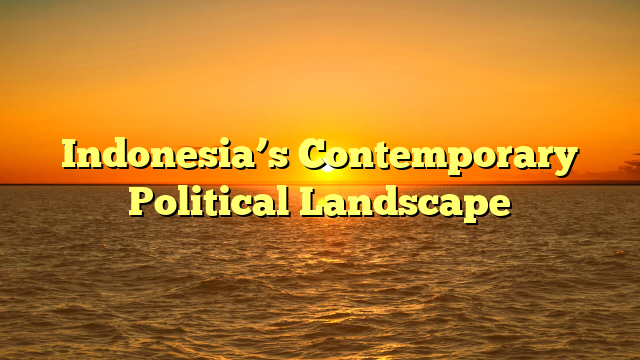Indonesia, the world’s third-largest democracy, is navigating a dynamic period in its political journey. With its vibrant multiparty system, young and diverse population, and growing global influence, the country stands at a crucial crossroads. Current political developments maritim4d reflect both opportunities for democratic consolidation and challenges rooted in governance, polarization, and economic management.
One of the most defining aspects of Indonesia’s politics today is the recent presidential transition. The 2024 election brought global attention, as the nation chose its next leader following President Joko Widodo’s decade-long leadership. Jokowi, as he is widely known, leaves behind a legacy of infrastructure development, economic growth, and social welfare expansion, but also controversies regarding democratic backsliding and human rights. His successor inherits a mixed landscape where public expectations are high, and the need for reforms is pressing.
The balance of power among political parties remains another critical dimension. Indonesia’s politics are dominated by large coalitions rather than singular parties, and compromise often shapes governance. This system ensures inclusivity but also creates complex negotiations that can dilute policy agendas. The upcoming years will test whether the ruling coalition can maintain stability or whether factionalism will hinder decisive governance.
Meanwhile, Indonesian democracy continues to grapple with the challenge of populism and identity politics. Religious and ethnic sentiments have often been mobilized during campaigns, creating both enthusiasm and division within society. While such dynamics reflect Indonesia’s diverse character, they also risk deepening polarization if not addressed with inclusive political strategies. Leaders face the task of balancing respect for cultural and religious identities while promoting unity in a nation of more than 17,000 islands and 270 million people.
Another pressing issue shaping politics today is economic governance. Indonesia seeks to strengthen its role in the global economy, particularly through industrial development, renewable energy investment, and participation in international trade. However, the government must address persistent problems such as inequality, corruption, and unemployment. Political debates increasingly revolve around how to sustain growth while ensuring fair distribution of wealth. These economic concerns are inseparable from politics, as public trust in leadership often depends on material improvements in citizens’ lives.
At the same time, Indonesia’s foreign policy is gaining prominence. As a leader within ASEAN and an influential player in the Global South, the country’s stance on international conflicts, climate negotiations, and trade partnerships matters more than ever. Political leaders are aware that foreign policy is not just about diplomacy but also about strengthening Indonesia’s domestic legitimacy. The balance between non-alignment and strategic partnerships will remain a defining factor in shaping political debates.
Civil society and the media also continue to play vital roles. Activists and journalists push for accountability, particularly regarding corruption and human rights. However, concerns about freedom of expression persist, as laws regulating online speech have been criticized for potentially stifling dissent. The extent to which Indonesia upholds democratic freedoms will be a key measure of its political maturity in the coming years.
In conclusion, Indonesian politics today are marked by both continuity and change. The post-Jokowi era brings uncertainty but also fresh opportunities for reform and democratic strengthening. The challenges of coalition governance, identity-based politics, economic inequality, and freedom of expression demand careful navigation. Yet, with its resilient democratic institutions and active civil society, Indonesia remains a country with strong potential to not only sustain but also deepen its democratic achievements. The coming years will reveal whether its leaders can meet the expectations of a dynamic and diverse nation while maintaining stability and inclusiveness.
